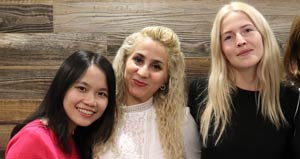
What makes an effective/affective change agent in TESOL
What makes an effective/affective change agent in TESOL? Reflections from the Summit on the Future of the TESOL Profession
By Evelin Suij-Ojeda
Last February, more than 200 TESOL professionals got together in Greece to reflect and discuss the future of the TESOL profession. During this 2-day event, in which I participated as part of the steering committee, many very insightful and interesting round table discussions regarding the future of TESOL as a complex, ever changing field took place.

Supported by inquiry, equity and professionalism as the guiding principles, and with the purpose of discussing the current state of our profession, along with how the future of TESOL is envisioned by professionals from different contexts and backgrounds, the conversations were focused on four main themes: Futurology, English and Multilingualism, Reimagining English Competence and the Profession as a Change Agent.
As an English teacher and teacher educator, what interested me the most were the discussions around making changes and innovations possible in my teaching context. I got to the summit with some questions in mind: How can I, a mainstream classroom teacher, become a change agent in my profession? What needs to be done? How can I become part of the shaping of the future of TESOL? It didn’t take long before I got my answers after listening to all presenters and participants, and I would love to share them with the WU community and family.
What makes an effective/affective change agent in TESOL?
TESOL change agents are those who:
- change their learners’ lives;
- are aware of the political, social, legal, cultural and economic mega-trends affecting the TESOL profession in their specific contexts;
- stay true to their core values of equity and professionalism while broadening their views of what counts as professional knowledge;
- use social media, any technology, or local TESOL affiliates or IATEFL associates to help promote local inquiry that resonates globally and involves everyone;
- allow local language to support English language learning and instruction;
- cultivate and encourage multilingualism (including publishing houses embracing the idea of multilingualism when developing English language materials) in order to walk away from the English Only policy;
- design lessons that positively influence attitudes towards all languages in a multilingual society;
- advocate for better fair language education as a right for everyone, specifically for those in challenging situations;
- rethink what it means to be competent in any language;
- strive for equity in teaching hiring practices;
- unmask the myth of what makes an excellent English language teacher;
- are able to align smart, applicable education programs/policies with the real needs of learners in the different contexts in which TESOL takes place;
- join and empower teachers’ associations to become part of the policy making process, initiatives and decisions;
- allow teachers’ voices to be heard beyond the classroom walls, which means teaching practices are taken as evidence to guide TESOL policies;
- find ways to connect research to the real questions all TESOL professionals have.
I know what you are thinking: this is lot to work on; it is too challenging; it takes lots of time and endless effort, but I would end this short writing by stating that I truly believe it is very possible if we embrace the idea of a brighter, more inclusive future in TESOL as well as acknowledge the very important role teachers’ associations play in helping TESOL leaders and teachers become change agents.
Would you like to have more information on the TESOL Summit? All the presentations were recorded and can be accessed at http://www.tesol.org/summit-2017

Can you think of anything else to add to this list? What do you think it takes to become a change agent in your own teaching context? Do not hesitate to comment on this post and share your expertise in the area of TESOL!






